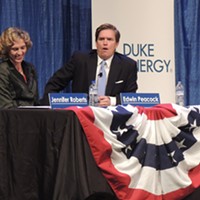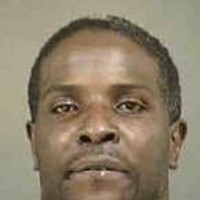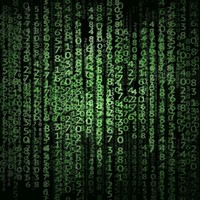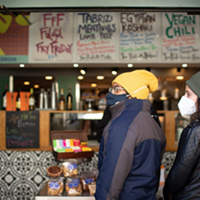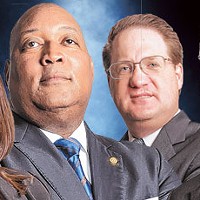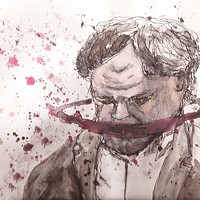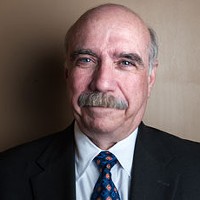Less than 7 percent of registered voters in Charlotte turned out for the primary in September, and that was actually a slight improvement over recent municipal elections. With a critical general election just days away, it's worth asking: What is it going to take to get Charlotteans to give a damn about local politics?
To be fair, there could be a sense of burnout here after hosting the Democratic National Convention and the winter meeting of the Republican National Committee, after being a critical electoral battleground in 2008 and again in 2012. Regardless, Election Day's results could define our city for decades to come on issues of transportation, economic development, sports and even local culture.
Two years ago, when I began covering politics for Creative Loafing, I was somewhat of an idealist. I had worked on campaigns. I believed in the system and that good people could, as Daniel Patrick Moynihan once said, use politics to "change a culture and save it from itself." But even I became a little cynical after interviewing hack candidates with prepared talking points and receiving fundraising emails after national tragedies.
Yet it wasn't until this year's race that I felt true exasperation and disillusionment with a process that had turned so dramatically from a contest of ideas to mere slogans plastered on billboards and printed on baseball caps. During an interview in which I asked Patrick Cannon a simple question, why was he running for mayor, he read his answer from a script. Edwin Peacock III admitted to me that he initially kept policy positions off of his website because they might provide his opponent with ammunition.
But let's be clear: Cannon has the experience and temperament to guide this city with a steady hand, while Peacock has the hopefulness and passion to challenge it to future greatness. We just couldn't throw our full weight behind either. But that doesn't mean we're going to stay home on Election Day.
I know that, after the government shutdown crisis and a disappointing state legislative session, you are probably fed up with politics. That nothing ever seems to change. That the candidates appear bought and sold by special-interest money. And that you hate the divisive partisanship and the petty bickering. But the solution to a broken system overcome by apathy cannot be more apathy.
When people stay home instead of making time for a 10-minute trip to fill out a ballot, it opens the door for the angriest and most extreme elements of the electorate, on the left and the right, to determine our future.
In 2010, low turnout allowed an injection of a mean-spirited reactionary populism into our politics that, because of redistricting, will take years to vote out of the state legislature. Prior to the most recent legislative session, North Carolina had a reputation as a progressive Southern state that was business-friendly yet committed to public education and equality. That reputation has come under attack. Now, instead of focusing on job creation and improving public education, our elected officials are distracted by Sharia Law and permitting guns on playgrounds. We have become the butt of jokes across the country. But in a few years, we have the power to reverse our current trajectory. In short, elections have consequences, especially if you stay on the couch.
We face immense challenges in this country, from income inequality to the need for comprehensive immigration reform, and Charlotte especially is at an important crossroads, which is why voting is important — but selecting your ideal candidate is even more important. John Grooms gave a lengthy list of Cannon and Peacock's achievements and failings. On the next page, Ana McKenzie has laid out candidates we'd like to see on the next ballot. Now it's your turn to decide who is right for you now and later.
If that isn't enough to convince you to vote, consider this: Unless lawsuits against the voter-ID bill aren't successful, during the next election, you will be required to bring a piece of photo identification and stand in a line that wraps around the building because early voting access was cut in half.
You will be writing a new chapter of local history when you step into the voting booth in November. Do so as informed as possible and with hope. Change is in your hands.
Michael A. Cooper Jr. is a graduate of the Charlotte School of Law, was a 2009 New Leaders Fellow at the Center for Progressive Leadership, and was born and raised in North Wilkesboro, N.C.
Speaking of...
Latest in Commentary
More by Michael A. Cooper Jr.
Calendar
-

Wine & Paint @ Blackfinn Ameripub- Ballantyne
-

Queen Charlotte Fair @ Route 29 Pavilion
-

NEW WINDOW GALLERY-Pat Rhea-ACRYLIC PAINTINGS-April 05-30 2024 VALDESE, NC 28690 @ New Window Gallery/Play It Again Records
- Through April 30, 12 p.m.
-

TheDiscountCodes
-

Face to Face Foundation Gala @ The Revelry North End
-
Esports in Charlotte Takes Off: A Guide to Virtual Competitions and Betting
-
Homer's night on the town 41
If you drank a shot with the Knights mascot on Sept. 20, you were basically harboring a fugitive
-
Canuck in the Queen City 7
A Canadian transplant looks back at her first year as a Charlotte resident





